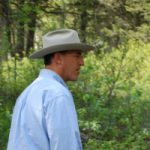Welcome New CPC Trustees & Conservation Partners
The heart of the Center for Plant Conservation (CPC) is its vibrant conservation community—a dedicated network of individuals and organizations united by a shared mission to safeguard plants and ensure a thriving future for our planet. From conservation practitioners and researchers to trustees, donors and plant enthusiasts, this community has been the cornerstone of CPC’s achievements over the past 40 years, continually growing stronger and more diverse.
CPC is delighted to close out 2024 by welcoming three new and two returning members to its Board of Trustees, along with two esteemed institutions joining our network of Conservation Partners to our growing community. These partnerships underscore CPC’s commitment to conservation, collaboration, and scientific innovation. Read on to meet the newest additions to our community!
Meet CPC’s New and Returning Trustees

Ruth Evans | Del Mar, CA
Since retiring from private medical practice in internal medicine and geriatrics, Ruth has been an active and founding member of the Rancho Santa Fe Literary Society and the Rancho Santa Fe Women’s Fund and has served as president of the Rancho Santa Fe Art Guild Board. She has served previous terms as a trustee for the Center for Plant Conservation and also served on the board of a CPC Participating Institution, the San Diego Botanic Garden, chairing a committee that envisioned and created a popular children’s garden, Seeds of Wonder. She designed and developed a small organic farm and served on the board of the Rancho Santa Fe Garden Club. She is also an award-winning artist and illustrator and has published two children’s books.

Dr. M. Patrick Griffith | Coral Gables, FL
Dr. M. Patrick Griffith has led Montgomery Botanical Center, a CPC Participating Institution, since 2005 – developing the team, focusing resources, and setting priorities to meet the mission. Patrick has worked in leadership, living collections, herbaria, rare plant survey, floristics, lab research, and land management, and for botanic gardens, universities, government, and private interests. Patrick’s research has been in plant systematics and conservation. Compelling palms and cycads have called Patrick to six continents and countless islands, but he is still not quite finished looking for them.

Thomas Lloyd-Butler | San Francisco, CA
Thomas Lloyd-Butler is an investor and 7th generation California rancher. He is a director at Grand-Jean Capital Management and a manager of Rancho Santa Clara del Norte, a 200-year-old family farming business. Thomas’s experience with plant conservation is personal. A self-taught gardener with the support and imagination of his partner, Dan Zelen, he manages the ranch’s 1,250 working acres with an additional six acres of historic grounds and gardens, all supporting a broad and historic plant a tree collection of nearly 1,000 taxa, 57 of which are documented on the IUCN red list. Thomas is overseeing the ranch’s transition from traditional to regenerative farming in collaboration with the University of California at Berkeley and other partners, planting habitat gardens of native plants that support the ranch’s 126 documented species of native pollinators.
Thomas graduated from the University of California at Berkeley in 1982, and began his career in the investment business at Morgan Guaranty Trust Co. in New York City soon after. He has been a principal with Grand-Jean Capital Management since 2011 where he analyzes investments in a variety of industries and manages client portfolios.

Suzanne Loomis | Weston, CT
Suzanne Loomis, educated at Stanford University, UC Berkeley, and San Francisco State University, has had a varied career as a writer and researcher, an active volunteer for community-based garden projects and as a former gallerist and museum director. She served on the board of directors of the Sonoma Botanical Garden (then Quarryhill Botanical Garden where she wrote a comprehensive history of the project) and the John Fairey Garden near Houston and served a previous terms as a Trustee of the Center for Plant Conservation. She has lived in distinctive places around the world, including Northern California; New Orleans, Louisiana; Cuernavaca, Mexico; Karen, Kenya in East Africa; and Sussex, England. Experience in these different zones has fostered a strong appreciation for the varied riches of the natural world. At home in Weston CT, she divides her time writing and working in her wild hillside garden.

Janet Mayfield | Kalaheo, Kauai, HI
Janet Mayfield is the President and Chief Executive Officer at National Tropical Botanical Garden (NTBG), a CPC Participating Institution. Janet leads five geographically distinct botanical gardens whose combined mission is to enrich life by perpetuating tropical plants, ecosystems, and cultural heritage. Rare plant conservation and research is at the forefront of our science and conservation programs. Having lived on Kauaʻi for over 36 years, she has a deep appreciation for the community, the culture, and the environment. She was raised on a farm in Eastern Washington and recognizes the complexity of creating sustainable food sources and the challenges of maintaining environmentally responsible agriculture.
Janet holds a BS in Accounting from Arizona State University and began her career with NTBG as Controller in 1997. From 2003-2018 she served as Chief Financial Officer and Chief Operating Officer. Janet assumed the role of Chief Executive Officer and Director in 2019 and successfully led the organization through the pandemic and helped to ensure a thriving, sustainable future for the organization. She is currently guiding the NTBG leadership team through the creation and implementation of a new 2023 – 2027 five-year strategic plan. In addition to her role with NTBG, Janet has extensive experience in the management and finances of other non-profit organizations and continues to serve on community boards and advisory committees.
_________________________________________________________________
Meet CPC’s New Conservation Partners

University of Florida, Department of Environmental Horticulture
Network Partner | Gainesville, FL
A primary mission of the University of Florida Seed Biology lab, created by UF Department of Environmental Horticulture Professor Héctor Pérez, is to advance the conservation and restoration of wild species. This is achieved by working at the intersection of seed biology and plant conservation. Projects range from field-based to laboratory investigations where the team asks questions related to how a changing climate influences plant regeneration from seeds, what enables seeds of wild species to tolerate various types of abiotic stress (e.g., desiccation, salinity, temperature, aging), and why does seed quality vary so much in seeds of wild species. The lab strives to translate research findings for the benefit of rare plant conservation.
Professor Pérez’s work in native plant conservation dates to the 1990s with an internship at Fairchild Tropical Botanical Garden. Later he earned a MS degree from the University of Florida working on understanding seed dormancy mechanisms of endangered plants native to Florida. Héctor earned his PhD from the University in Hawaii working on the seed biology of endemic loulu palms (Pritchardia spp.). During that time, he developed strong partnerships with Lyon Arboretum, National Tropical Botanical Garden, the US Army Natural Resources Division on Oahu, and the National Laboratory for Genetic Resources Preservation in Ft. Collins, Colorado. Héctor created the UF Seed Biology lab as an assistant professor upon arriving at the University of Florida.

Santa Fe Botanical Garden
Participating Institution | Santa Fe, NM
The Santa Fe Botanical Garden (SFBG) celebrates, cultivates and conserves the rich botanical heritage and biodiversity of its region with the aim to significantly support and enhance the region’s botanical research and conservation efforts.
The Garden’s living collections consist of approximately 430 taxa with approximately 40% native to New Mexico. Their rare and endangered collections include cacti such as Cylindropuntia × viridiflora (Santa Fe cholla) and Escobaria sneedii var. leei (Lee’s Pincushion Cactus), and a recent wild-collected, grown from seed, collection of 27 plants of endemic Penstemon neomexicanus donated from partners at Albuquerque BioPark. SFBG also maintains an herbarium, including collections donated from the New Mexico Natural History Institute, which facilitates the documentation and study of New Mexico’s unique plants, contributing to the understanding of local biodiversity and ecological processes. It provides a vital resource for local researchers, educators, and conservationists, fostering collaborations and promoting awareness of the region’s botanical heritage.